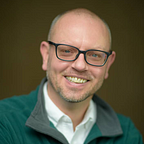The Gritty Professor
In her book, Grit, Dr. Angela Duckworth writes, “I may not be the smartest person in the room, but I’ll strive to be the grittiest.” Her book is filled with stories of admiration for others who have displayed tenacity in order to succeed. The following is a retelling of one of these stories.
Scott Barry Kaufman’s education began inauspiciously. By the time he had reached third grade, it was clear that he was struggling. To get to the bottom of things, Scott was given an IQ test. By that time in the late 1980s, the IQ test had been around for nearly 90 years. It had been designed by French psychologist Alfred Binet to assess someone’s mental abilities at a singular point in time. The results of his test were NOT meant to be a label a child would wear throughout the rest of their educational career. Nevertheless, many students have been unduly influenced by the results of a singular poor test result. Scott Kaufman was one of them.
As a young child, Scott suffered from a series of ear infections. This resulted in difficulty processing audio information in real time. As a result, “I was always a step or two behind the other kids in my class,” he remembered. This caused him to repeat third grade and that, coupled with his poor performance on the IQ test, resulted in him being sent to a special school for children with learning disabilities.
For the next six years, Scott attended that school, and most likely would have continued doing so until graduation if it were not for the insight of one astute educator. This special education teacher noticed Scott’s unfulfilled academic potential. Pulling him aside, she asked, “Why aren’t you taking more challenging classes?” This teacher’s belief in him was just the thing Scott needed to begin believing in himself. It ignited a passion for learning, and he began enrolling in new classes and activities, including choir, the school musical, Latin class, you name it.
Furthermore, it was at this time that Scott discovered his love for the cello. His grandfather had been a cellist in the Philadelphia Orchestra for nearly 50 years, and Scott began taking lessons from him. Soon, he was practicing his instrument 8 hours a day, even forgoing lunch to get in extra time. As Scott recalled, “I was so driven to just show someone, anyone, that I was intellectually capable of anything. At this point I didn’t even care what it was.” From there, Scott joined the school orchestra, finishing his senior year as second chair cello.
Kaufman wanted more though. In particular, he wanted more demanding academic classes. However, his school psychologist, after pulling his file and referencing Scott’s IQ score from third grade, said no. He would hear “no” again after applying to Carnegie Mellon, most likely due to Scott’s low score on the SAT. Undaunted, Scott reapplied to Carnegie Mellon, this time to the opera program (where a low SAT score wasn’t a disqualifier), and was accepted. Over time, while studying opera, Scott began collecting courses in psychology, eventually transferring his major from opera to psychology. Scott was able to outsmart the system to achieve the education he wanted. In doing so, he proved he was intellectually capable of anything, graduating Phi Betta Kappa, the most prestigious academic undergraduate honor one can receive.
Today, Scott is known as Dr. Kaufman, a leading voice on creativity, as well as humanistic and positive psychology. He is a well-respected scholar, having by the age of 41 taught at Columbia University, NYU, and the University of Pennsylvania. He is also the author of Transcend, a modern look at Maslow’s Hierarchy of Needs, and the host of The Psychology Podcast.
Scott’s impressive contributions to science would not have been possible if not for the encouragement of one unnamed educator. His story demonstrates the dangers of academic labels and believing in the limitations of our status quo. It also shines the light on how the support of others can inspire us to be at our grittiest.
_________________________________________________________________
Wanting to read more like this? Sign up for the very latest from Wes Steele and receive free weekly psychological insights with Mэntal Musings.
